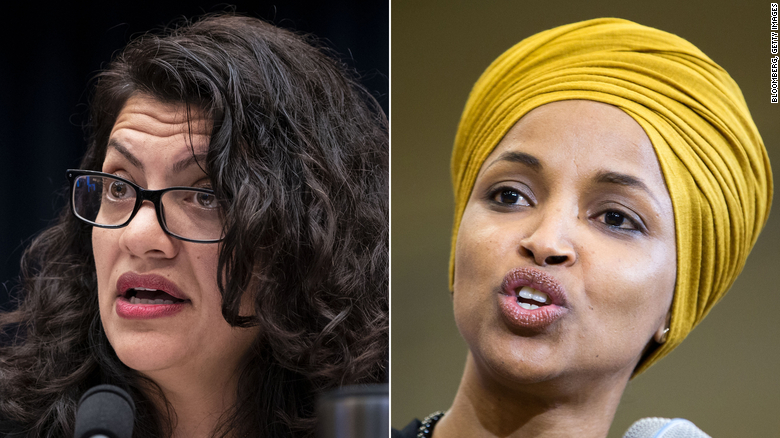
Bloomberg, Getty Images
(CNN)A series of galvanizing victories in Democratic congressional primaries this year have progressives poised to assert their growing influence in the next Congress.
But plans for a larger and more robust “squad” hinge on securing its foundation — and defending the seats they first won in 2018.
Over the next 10 days, Reps. Rashida Tlaib of Michigan and Ilhan Omar of Minnesota, will be tested by challengers who have sought to turn their star power against them, arguing, in both contests, that the freshmen lawmakers have chased the national spotlight at the expense of their districts.
New York Rep. Alexandria Ocasio-Cortez, who brushed aside a well-funded centrist opponent in June to cement her status in the party and on Capitol Hill, heard a similar line of attack. It didn’t land. Allies of Omar and Tlaib, the first two Muslim women elected to Congress, say that their races will run a similar course, ending with decisive electoral confirmations that the Democratic Party’s future, even with former Vice President Joe Biden as its presidential nominee, is being driven by a younger, more diverse and increasingly liberal voter base.
“There is a massive effort by Republicans and by the corporate wing of the Democratic Party to destroy the ‘squad’ and make it seem like they’re vulnerable and out of touch,” said Waleed Shahid, communications director for Justice Democrats, the group on the frontlines of the party’s progressive insurgency. “But AOC was already able to show that much of that is manufactured. In terms of Rashida and Ilhan, I just think that the ‘squad’ represents the direction that the Democratic Party is heading.”
The pressure points in Tlaib and Omar’s contests are different. Omar represents Minnesota’s 5th District, where George Floyd was killed by a police officer on Memorial Day. The district is a hotbed of activism and the state party’s wheelhouse for driving turnout in statewide races. In Michigan, Tlaib’s 13th District, which has seen its boundaries shift over the years and likely will again ahead of the 2022 midterms, has for most of the past six decades been represented by Black lawmakers with deep ties in Detroit politics.
Tlaib goes head-to-head with a familiar rival
Of the two, Tlaib, whose primary is this coming Tuesday, entered congressional politics in a more precarious position. She won the nomination two years ago in a six-way race with a little more than 31% of the vote. This time, Tlaib is in a head-to-head clash with Detroit City Council President Brenda Jones, who finished second in the 2018 primary and now has the support of the other four candidates from that race.
“When you think about the 13th Congressional District, historically, you go back to George Crockett, you can go back to Carolyn Cheeks Kilpatrick, you can go back to Barbara-Rose Collins, you can go back to John Conyers,” said Marvin Beatty of the Jones campaign, ticking off Black lawmakers who have represented the district in the past. “This has been a historically African American seat and it’s unfortunate that two years ago a crowded field allowed that to change.”
Tlaib’s communications director, Denzel McCampbell, who is Black and lives in the 13th District, said the contest would not be decided on those terms — and noted that, unlike in 2018, Tlaib now has a record of performance to run on.
“They want someone who will stand by their word and stick up for the issues that matter most to them, and that’s what Rep. Tlaib is doing,” he said. “Her legislation comes from the district. She doesn’t act without input from her constituents. That’s what residents demand.”
Beatty also accused Tlaib of effectively leaving the district to “fend for itself” while she engages in broader fights over the future of national and international politics.
“Where we find ourselves is that Ms. Tlaib has done an excellent job in marketing herself,” Beatty said, “and done very poorly in raising the level of opportunity for people in the 13th District.”
But Jones, who only entered the race in late March and then announced she had tested positive for Covid-19 in early April, has struggled to raise money, while Tlaib, now enjoying some of the inherent advantages of incumbency, has a joint fundraising committee, announced at the beginning of July, called the “Squad Victory Fund,” available as a backstop, along with the support of national small dollar magnets like Vermont Sen. Bernie Sanders.
Tlaib has raised more than $3 million so far and spent about a third of it, while Jones’ total for the cycle, according to the most recent public information, is less than $200,000. She launched her first television ad this past week after being on the radio most of July.
“All of those things cost money. We didn’t have it. But we are working in the street every day and we think that’s going to make the difference,” Beatty said, before shifting the conversation to Tlaib’s reluctance, so far, to formally endorse presumptive Democratic presidential nominee Joe Biden. Tlaib told Newsweek last Monday that her constituents “don’t need to be bogged down” in conversations about Biden and will take their inspiration, come November, in turning out to defeat President Donald Trump.
Still, House Speaker Nancy Pelosi endorsed Tlaib this week, calling her a “tireless advocate for the residents of Michigan’s 13th District” and touting her work to secure “critical funding to stop water shutoffs and replace lead pipes.” She also has the support of leading labor groups, including the AFL-CIO of Michigan, the UAW, the Service Employees International Union’s Michigan Council, and the state chapter of the American Federation of Teachers.
McCampbell rejected suggestions that the congresswoman — who kicked off her term by promising to “impeach this mother****r” at an event hours after being sworn-in — is too divisive or preoccupied with national politics.
“I think it’s divorced from reality,” McCampbell said. “When you look at the actual receipts, when you look at Rep. Tlaib’s work, it’s rare for a freshman to have a bill signed into law, especially (by) a president of the opposing party. And she did that. And that’s the same President that she ran on impeaching.”
Omar faces a well-funded challenge in Minnesota
Since arriving in Congress, Omar has both placed herself, and been foisted by Trump, into the center of the national political scrum.
In the summer of 2019, Trump, seizing on tensions among House Democrats, tweeted that “‘Progressive’ Democrat Congresswomen” — a clear reference to the “squad” — should “go back and help fix the totally broken and crime infested places from which they came.”
A few days later, at a rally in North Carolina, Trump attacked Omar by name, then quietly stood by as the crowd chanted, “Send her back!” When Omar, a Somali-American immigrant — returned home — to Minnesota — from Washington a day later, she was greeted in the airport by throngs of adoring supporters.
Omar is one of the most popular figures on the progressive left and a top target for many moderate national Democrats ahead of her own primary, a week after Tlaib’s, on August 11. Her challenger, lawyer and first-time candidate Antone Melton-Meaux, has raised nearly $4 million, with almost $500,000 of it bundled by a pair of pro-Israel political action committees — in part a legacy of the backlash to Omar’s past criticisms of the pro-Israel lobby’s influence on lawmakers, which many described as employing “anti-Semitic tropes.”
She apologized and, though the issue is never too far from the surface, has sought to limit the damage and win over skeptics. Last May, she co-authored an op-ed with Illinois Rep. Jan Schakowsky, who is Jewish, urging the Muslim and Jewish communities to “come together to confront the twin evils of anti-Semitic and Islamophobic violence.” Ahead of the primary, more than 150 Jewish constituents wrote an open letter backing her and she received testimonials, in a pair of columns, from Jewish leaders.
Melton-Meaux has been cautious about broaching the issue, saying in an interview that Omar’s past comments had created “a lack of trust” in the Jewish community that she had not adequately sought to repair. But his campaign — “Focused on the 5th” is its slogan — has spent more time questioning Omar’s national profile, and whether it has distracted her from the job.
In an interview, Melton-Meaux criticized Omar for missing votes in the House and for her opposition to the United States-Mexico-Canada Agreement, the Trump administration-brokered trade deal that, with support from the AFL-CIO, replaced the North American Free Trade Agreement.
“We don’t need another celebrity. We don’t need dividers. We need people that are going to work and unite us to challenge and take hold of these problems that we face as a community,” Melton-Meaux said on Thursday, after suggesting Omar had engaged “unnecessarily” in “Twitter fights” with Trump. (On Friday, Trump attacked Omar again during a stop in Florida, saying she “doesn’t love our country” and laughing when someone in the audience could be heard yelling, “Deport her!”)
In a statement, Omar hit back at Melton-Meaux’s suggestion that engaging publicly with Trump could be counterproductive.
“We are facing a president who explicitly targets me and other women of color regularly. When the President says me and other women of color should be ‘sent back’ to where we came from — that is language many immigrants and marginalized people have heard for decades to silence us and make us feel like we don’t have a voice,” Omar said. “Standing up to Donald Trump is not division. It is standing up for every community that has been targeted by a xenophobic and hate filled bully that happens to live in the White House.”
Melton-Meaux has largely avoided clashing with Omar on policy. He said he would support “Medicare for All” “if it came across my desk,” and spoke glowingly about the Green New Deal, though his mention of carbon tax as a tool for bringing large corporations “into the conversation as a solution and revenue source” might rankle some climate activists.
Despite being outraised by her challenger, Omar, who lost her father this year to Covid-19, has across-the-board support from the state’s Democratic-Farmer-Labor Party, including popular figures like her predecessor in the 5th District, Minnesota Attorney General Keith Ellison. Like Tlaib, Omar also has the endorsement of Pelosi, who — despite being critical of the left at times — has consistently backed her incumbent members.
Omar’s victory in 2018 has also helped her case.
She won with record midterm turnout in Minneapolis and, after 2016, when Trump came close to removing Minnesota from Democrats’ breached blue wall, Omar’s allies argue that the party — led by Biden — needs the energy she brings to the electorate to ensure the 5th District, a Democratic hub and the epicenter of the protest movement that followed the killing of Floyd by a police officer in Minneapolis, votes in large numbers.
Omar’s influence — and her standing in the community — was made clear during the early days of the protests, her communications director Jeremy Slevin said, allowing her to bridge the divides her opponent and other critics argue she has worsened.
“We brought all of (the state political establishment) together, the senators, the governors, the mayors, lieutenant governor, to a listening session with the actual activist and protesters,” Slevin said of an event scheduled during a tense moment early on in the demonstrations. “And they just listened, and didn’t talk. I think it helped on both sides. It quelled some of the tensions between the political class, even Democrats, and the protesters. And I think that’s something that only Ilhan could have done.”













